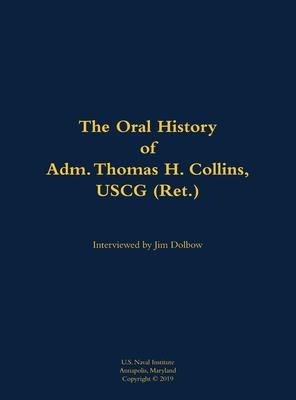Admiral Collins served for an eventful 38 years, from the time he entered the U.S. Coast Guard Academy in the summer of 1964 until his retirement as the 22nd Commandant of the Coast Guard in May 2006. From the Cold War to the War on Drugs to protecting the U.S. homeland, Collins held six different major commands. Admiral Collins’ oral history interviews reveal that he was a leader skilled at implementing organizational change in a dynamic and large institution like the Coast Guard. It was a skill he honed throughout his entire career and one he put to good use as he achieved greater responsibility. One of many examples of him being a change agent was his vision that led to the establishment of Coast Guard Sectors during his tenure as Commandant. As Commandant, Admiral Collins oversaw an aging Coast Guard fleet of cutters, aircraft, and communication systems and an active duty force that was about the same size as the New York City Police Department. Despite the chronic underfunding of the Coast Guard, which readers are made well aware of throughout the interview, given Collins’ budget expertise, the Coast Guard lived up to its motto of "Semper Paratus" and prevented any terrorist attack in our nation’s 361 ports and 95,000 miles of waterways-no small feat considering the attacks on the aviation sector on September 11, 2001, and the concerns that the maritime sector was the next target. Moreover, Admiral Collins deployed Coast Guard personnel and platforms overseas in support of Operation Iraqi Freedom in March 2003. Finally, as if guarding the U.S. homeland against a maritime 9/11 attack and deploying forces in support of DOD’s combatant commanders weren’t enough, Admiral Collins also oversaw the transfer of the U.S. Coast Guard from the Department of Transportation to the newly created Department of Homeland Security in March 2003, followed two years later by the Coast Guard’s rescue from peril of 24,145 lives and the evacuation of 9,409 medical evacuations in the aftermath of Hurricane Katrina. Admiral Collins’ memoir serves as an invaluable resource on a significant chapter in U.S. Coast Guard history, as well as a testament to a remarkable career.
| FindBook |
有 1 項符合
Oral History of Adm. Thomas H. Collins, USCG (Ret.)的圖書 |
 |
Oral History of Adm. Thomas H. Collins, USCG (Ret.) 作者:Collins 出版社:US Naval Institute Press 出版日期:2019-03-25 語言:英文 規格:精裝 / 390頁 / 27.94 x 21.59 x 2.24 cm / 普通級/ 初版 |
| 圖書館借閱 |
| 國家圖書館 | 全國圖書書目資訊網 | 國立公共資訊圖書館 | 電子書服務平台 | MetaCat 跨館整合查詢 |
| 臺北市立圖書館 | 新北市立圖書館 | 基隆市公共圖書館 | 桃園市立圖書館 | 新竹縣公共圖書館 |
| 苗栗縣立圖書館 | 臺中市立圖書館 | 彰化縣公共圖書館 | 南投縣文化局 | 雲林縣公共圖書館 |
| 嘉義縣圖書館 | 臺南市立圖書館 | 高雄市立圖書館 | 屏東縣公共圖書館 | 宜蘭縣公共圖書館 |
| 花蓮縣文化局 | 臺東縣文化處 |
|
|
圖書介紹 - 資料來源:博客來 評分:
圖書名稱:Oral History of Adm. Thomas H. Collins, USCG (Ret.)
|











